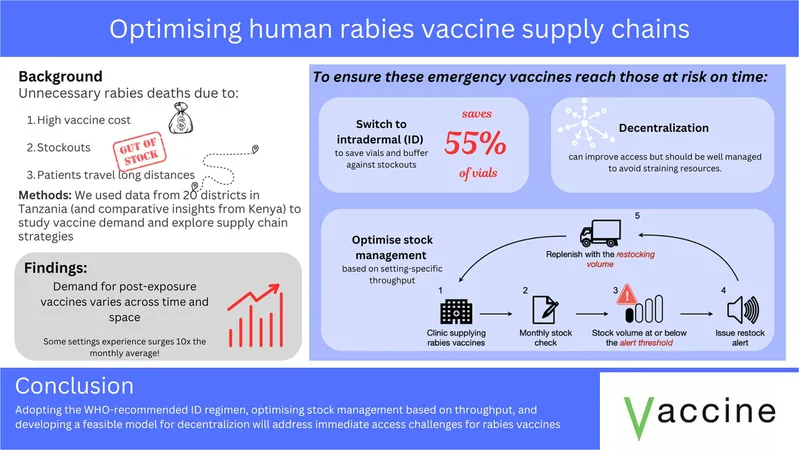
Revolutionary Study Unveils Roadmap to Combat Rabies with Improved Vaccine Delivery
2025-05-15
Author: Wei
Major Breakthrough in Rabies Vaccine Distribution
A groundbreaking new study published in the journal Vaccine reveals that enhancing the supply chain and delivery of human rabies vaccines in Tanzania and Kenya could dramatically cut preventable deaths and optimize health budgets.
Collaborative Research for Life-Saving Solutions
Conducted by experts from prestigious institutions including the University of Glasgow and the University of Nairobi, the study highlights a revolutionary approach: using the World Health Organization's (WHO) recommended intradermal (ID) vaccination method. This method has the potential to decrease vaccine usage by over 55%, ensuring that one vial can treat multiple patients. This significant reduction helps mitigate stockouts, particularly in rural regions where healthcare access is limited.
A Deadly Disease on the Rise
Rabies remains one of the deadliest diseases worldwide, particularly affecting low- and middle-income countries, with approximately 59,000 fatalities each year. The primary reason for these alarming statistics is the lack of timely access to post-exposure prophylaxis (PEP) vaccines, often hindered by frequent stockouts, prohibitive costs, and long distances to healthcare facilities.
Addressing Supply Chain Challenges
This comprehensive modeling study utilizes real-world data from Kenya and Tanzania to analyze vaccine demand, supply chain obstacles, and effective management strategies. It suggests that by adopting WHO guidelines on ID vaccination, enhancing inventory management, and decentralizing PEP services, countries can significantly improve their capacity to provide life-saving vaccines to those at risk.
Quote from the Expert: A Call to Action
Martha Luka, the study's lead author and a postgraduate researcher from the University of Glasgow, passionately stated, "It is unacceptable that people are still dying from rabies when effective vaccines are available. By enhancing stock management and implementing intradermal vaccination, more people can be protected with fewer resources."
Decentralizing Access for Greater Equity
The study also emphasizes the need for decentralizing rabies vaccine access, particularly in Tanzania where PEP is primarily available only at central hospitals. Expanding access to local clinics would improve healthcare equity, especially for remote communities. Custom restocking strategies tailored to each facility's patient volume are crucial in preventing shortages.

 Brasil (PT)
Brasil (PT)
 Canada (EN)
Canada (EN)
 Chile (ES)
Chile (ES)
 Česko (CS)
Česko (CS)
 대한민국 (KO)
대한민국 (KO)
 España (ES)
España (ES)
 France (FR)
France (FR)
 Hong Kong (EN)
Hong Kong (EN)
 Italia (IT)
Italia (IT)
 日本 (JA)
日本 (JA)
 Magyarország (HU)
Magyarország (HU)
 Norge (NO)
Norge (NO)
 Polska (PL)
Polska (PL)
 Schweiz (DE)
Schweiz (DE)
 Singapore (EN)
Singapore (EN)
 Sverige (SV)
Sverige (SV)
 Suomi (FI)
Suomi (FI)
 Türkiye (TR)
Türkiye (TR)
 الإمارات العربية المتحدة (AR)
الإمارات العربية المتحدة (AR)